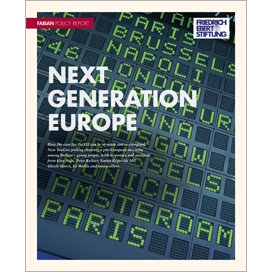Next Generation Europe: How the case for the EU can be remade and re-energised
The pro-EU argument needs to spell out the practical benefits of the EU. This means addressing the insecurities of young people around job losses and immigration, whilst at the same time demonstrating what the EU brings to their day-to-day lives.

- Next Generation Europe
- Ed Wallis , Sofie Jenkinson
- 3 May 2013
The EU was founded on a ‘never again’ spirit following the second world war, yet the arguments the first generation of European leaders made for closer integration resonate less and less as time goes by.
A growing proportion of the electorate are too young to remember the fall of the Berlin Wall, let alone the despair of post-war Europe. For a new generation, the EU is a way of life rather than a political project.
This is a double-edged sword for pro-Europeans. New polling conducted by YouGov for the Fabian Society and Friedrich Ebert Stiftung shows that 18-to-34-year-olds are instinctively and culturally more pro-European than other groups having grown up with the benefits of cross-continental co-operation. Yet there is also a fear that this will not translate politically and the next generation will not take a stand for the EU in the increasingly anti-EU climate in Britain. The task for EU advocates is therefore to involve them and harden their soft support.
This policy report investigates how to do this, featuring a range of young British and non-British authors responding to different aspects of the polling. Kira Huju, for example, points to the different attitudes of Finnish and British young people towards the EU; Brhmie Balaram explores the challenges and opportunities of free movement of labour; and Yiannis Baboulias considers the consequences of the eurozone crisis. Elsewhere, the Labour party’s shadow Europe minister Emma Reynolds MP and Peter Kellner, president of YouGov, analyse the results of the poll and show how social democrats can make a positive case for Europe during a time of huge economic and social pressures for the young.
The report concludes with two case studies which demonstrate the practical ways cross-continental co-operation can benefit young people’s lives: The Youth Secure Streets Project and the European Youth Parliament.
Click here to download full polling
Editors
Fabian membership
Join the Fabian Society today and help shape the future of the left
You’ll receive the quarterly Fabian Review and at least four reports or pamphlets each year sent to your door
Be a part of the debate at Fabian conferences and events and join one of our network of local Fabian societies
Join the Fabian SocietyBe the first to know
Sign up to the free Fabian Society newsletter
Find out about the latest Fabian Society research, publications and events with our regular updates
Sign up today
